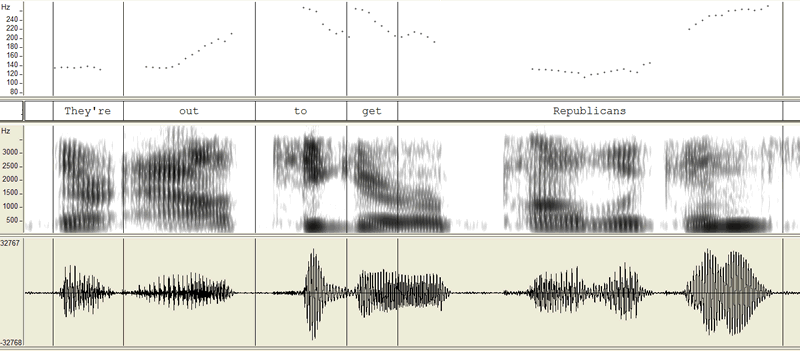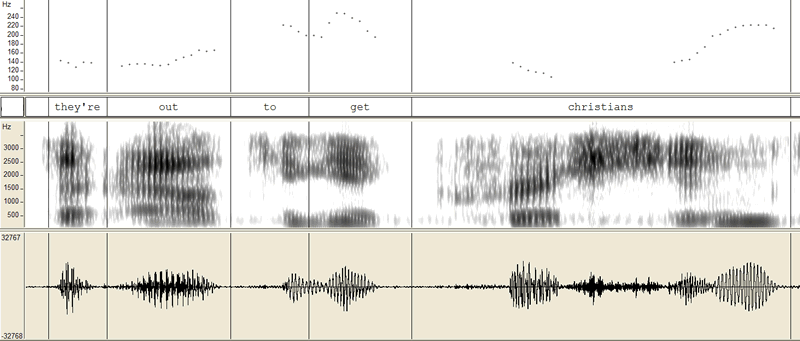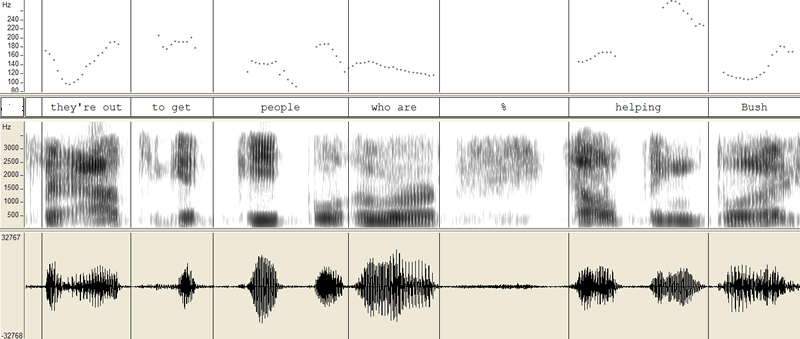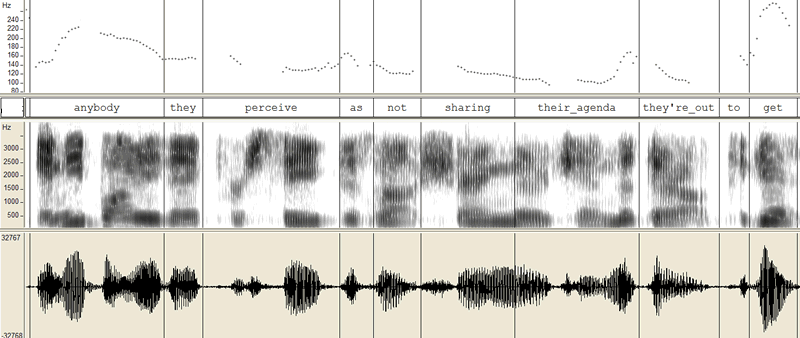February 11, 2006
Angry rises
George C. Deutsch has fired back at his critics, in a radio interview on WTAW in Bryan, Texas. For those of you who haven't been following the story, Deutsch is a recent political appointee in NASA's public affairs department, who got crossways with NASA scientists over theories of global warming and the origins of the universe. His peroration:
This is -- an agenda! It's a culture war agenda! They're out to get Republicans, they're out to get Christians, they're out to get people who are {breath} helping Bush; anybody they perceive as not sharing their agenda, they're out to get!
This being Language Log, my focus is not on his politics, nor on his paranoia, but on his pitch.
Listen to his last sentence. (If you want to hear it in context, four sections of the interview are available on WTAW's web site -- part 1, part 2, part 3, part 4 -- and the quoted passage is at the very end of part 4.)
Now pay attention to the pitch contour. Below, I've given you some graphical aids, with an orthographic transcription and (from top to bottom) a display of fundamental frequency, a wide-band spectrogram, and an audio waveform.
We might crudely symbolize Deutsch's first phrase as
They're OUT to get _/ RePUBlicans _/
The boldface caps indicates that the main stressed syllables are "out" and "pub". The _/ notations mark the ends of two subphrases, and indicate that in each subphrase, Deutsch is using his locally lowest pitch on the stressed syllable, and then rising to the end of the phrase.
This passage is a good example of how rising intonation is not always (or even mostly) associated with what Taylor Mali called "invisible question marks" used by people who are unwilling to "declare things to be true". Deutsch continue with the same pattern:
They're OUT to get _/ CHRIStians _/
After the build-up from "Republicans" to "Christians", "people who are helping Bush" is a bit of a rhetorical ebb, not to say anti-climax, so the final rise is smaller:
(The plotted high pitch in the second syllable of "helping" is a pitch-tracker error.) Deutch closes with a bang. There are two (gently) rising subphrases, and then a final high (fall?):
Anybody they perceive as _/ not sharing their agenda _/ they're out to get ^
It's hard to tell what the final contour direction is, since the strength of his convictions propels his last word into falsetto mode, but certainly the final "get" starts high.
This example is slightly unfair to the proponents of uptalk-as-self-doubt, since in the case just examined, final rises mark the members of a list (of conspiracy targets), and "list intonation" is another of the traditionally-recognized uses for rising contours in English. However, sequences of repeated poke-in-the-chest rises are frequent in this interview, and generally enumeration does not seem to be involved, except insofar as rhetorical repetition can be considered to be a sort of listing. (A small sample can be heard here, here, here.) The communicative crux in these examples is certainly not self-doubt, nor does it seem to be the mere implication that there is more to come. Perhaps the rises are intended to reach out and seize the listener's attention, like the Ancient Mariner's eye contact:
He holds him with his glittering eye--
The Wedding-Guest stood still,
And listens like a three years' child :
The Mariner hath his will.
Or perhaps they're intended to compel a response, if only an internal one. In any case, Deutsch's interview seems to confirm David Brazil's observation that "rise tones" can be used to "assert dominance and control".
Of course, not every one of the phrases in this interview is rising, and a responsible analysis (rather than a simple blog post) would try to explain the complete distribution of contours, not just present a few evocative anecdotes. The roughly 9 minutes of speech in Deutsch's four posted interview fragments may not offer enough data to distinguish among alternative hypotheses about what Mr. Deutsch's intonational repertoire really is, and how he deploys it in relation to the content and context of his communications. But he's a forceful and effective speaker with a lot on his mind, and I expect that we'll be hearing more from him in the future.
[More Deutsch links: Nick Anthis at The Scientific Activist 1/30/06, 2/6/06, 2/8/06, 2/9/06; NYT 2/8/06, NYT 2/10/06, WaPo 2/10/06, Houston Chronicle 2/10/06, Ap 1/9/06. Curiously, as of mid-day 2/11/06, searches for "Deutsch" on the Fox News and the Washington Times sites turned up nothing. ]
[Update: Several readers have written in to express some puzzlement (or disagreement) about what (they take me to be claiming as) the form and meaning of the intonational patterns involved here. Without going into detail, let me say that there are certainly several different patterns in these examples, which may differ in kind as well as in degree; and that final rises can certainly sometimes be used in asking questions, in signaling that a list isn't finished, and -- yes -- in expressing uncertainty. My main goal in this post was to undermine the widespread belief that final rises are always "question intonation", and that rises on statements must therefore represent uncertainty about their content. A much more plausible idea about final rises was proposed in McLemore (1991), where it was suggested that a metaphor of connection unifies such uses as marking non-final list items, evoking shared knowledge, and inviting a response. Whatever the correct description is, it's probably not a matter of position on scales of relative confidence and dominance. If final rises are sometimes used to signal self-doubt, or more often used for (perhaps benevolent) communicative control, it's for the same reasons that nearly any linguistic tool can be used for nearly any interactional purpose. ]
[Other Language Log "uptalk" posts:
This is, like, such total crap? (5/15/2005)
Uptalk uptick (12/15/2005)
Further thoughts on "the Affect" (3/22/2006)
Uptalk is not HRT (3/28/2006)
]
Posted by Mark Liberman at February 11, 2006 10:23 AM


